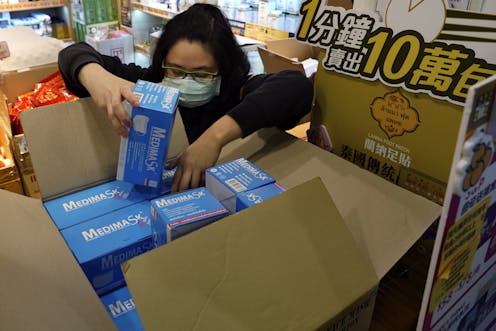A company's good deeds can make consumers think its products are safer
- Written by Valerie Good, Published Researcher and Marketing Faculty, Michigan State University

The Research Brief is a short take on interesting academic work.
The big idea
Companies like to highlight when they do good things for society, such as making charitable donations[1], becoming more environmentally friendly[2] or improving the diversity of their workforce[3]. Broadly, these behaviors come under the umbrella of corporate social responsibility. Companies do them to increase customer loyalty[4] and, ultimately, earn more revenue.
Past research[5] has suggested that customers like to purchase more from companies that do good deeds because of the “warm glow” that comes with it. In a new study[6], however, three colleagues and I discovered that there’s another effect motivating consumer behavior: These activities can make people think the firms’ products or services are safer and of higher quality.
When people see companies spending resources on socially responsible activities, they infer that these firms are invested in building long-term relationships with its customers. That is, they assume companies are not trying to cheat them into buying inferior quality products or services. For example, when Boeing donated[7] 250,000 medical-grade respiratory masks to address supply shortages in China, it likely not only created goodwill among consumers but also reduced the perception that flying aboard one of its planes is risky.
Why it matters
Society needs companies to invest in corporate social responsibility. Businesses can do far more good than any one individual. But managers are always under pressure to demonstrate how such investments – even ones intended to benefit society at large – will affect their bottom line.
Importantly, our analysis suggests that the types of activities that have the biggest impact for companies involve actual changes to their operations, such as by making products safer or more environmentally friendly, rather than unrelated things like charitable giving. An example is Ford investing in making its self-driving cars safer[8].
While consumers want to see companies giving back to society, what is more important is that they create safer and higher quality products that benefit customers, the environment and society in the long term.
How I do my work
My colleagues and I analyze publicly available archival data on companies and their activities and perform experiments in the lab. For example, we brought participants into the lab and had some of them read a scenario involving a company’s corporate social responsibility efforts, while others did not. We then measured each group’s perceptions of the risk of buying the company’s products. This allowed us to better understand cause and effect.
What’s next
While this research offers suggestions to managers about when and how to use corporate social responsibility, future researchers may want to explore whether it may be of value in controversial industries such as tobacco and gambling, where such efforts may be employed as a means to offset past irresponsibility. It would also be interesting to investigate how long it may take companies to recuperate investments in corporate social responsibility.
[Get the best of The Conversation, every weekend. Sign up for our weekly newsletter[9].]
References
- ^ charitable donations (money.cnn.com)
- ^ environmentally friendly (www.reuters.com)
- ^ improving the diversity of their workforce (www.usnews.com)
- ^ increase customer loyalty (business-ethics.com)
- ^ Past research (doi.org)
- ^ new study (link.springer.com)
- ^ Boeing donated (www.yahoo.com)
- ^ Ford investing in making its self-driving cars safer (www.theverge.com)
- ^ Sign up for our weekly newsletter (theconversation.com)
Authors: Valerie Good, Published Researcher and Marketing Faculty, Michigan State University

